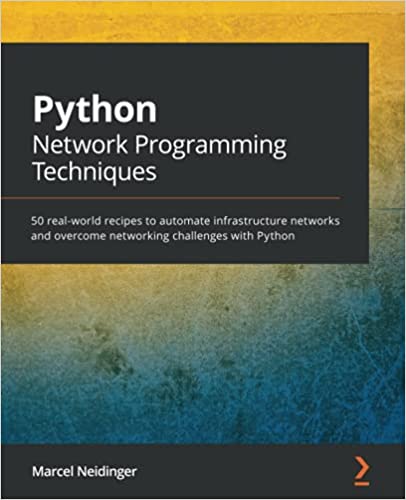Marcel is the author of Python Network Programming Techniques, we got the chance to sit down with him and find out more about his experience of writing with Packt.
Q: What is/are your specialist tech area(s)?
Marcel: Automation & APIs
Q: How did you become an author for Packt? Tell us about your journey. What was your motivation for writing this book?
Marcel: Working with and enabling network engineers to discover the new world of infrastructure automation in my day job I wanted to write a book that shows the programming side of automation. Many engineers know very well how to configure a device. With this book I wanted to show them the techniques and packages needed to leverage their existing knowledge of networking device and pair that with programming to make the first steps towards infrastructure automation.
Q: What kind of research did you do, and how long did you spend researching before beginning the book?
Marcel: Research was mainly done by assembling the packages and code sample. My goal was to use each chapter, and thus each new package, to intrdouce a different aspect of infrastructure automation. From low-level automation connecting to devices via SSH to high-level cloud APIs I wanted to introduce all the different toolsets available so that the readers can then choose which tool is the most appropriate for the job they are facing.
Q: Did you face any challenges during the writing process? How did you overcome them?
Marcel: Pairing the writing of the book with a full time job and part time studies was certainly a challenge. Making sacrifices in ones private live as well as the incredibly helpful, understanding and supportive product team at packt made the process difficult but enjoyable nethertheless.
Q: What’s your take on the technologies discussed in the book? Where do you see these technologies heading in the future?
Marcel: With the increased demands put on modern networking infrastructure there is no way around automation. We want to do changes faster and more frequently while at the same time minimizing downtime and error rate. In my opinion this can only be achived through update, rollout and maintenance processes that incorporate automation.
Q: Why should readers choose this book over others already on the market? How would you differentiate your book from its competition?
Marcel: This book tries to give you an overview of the programming parts required to automate your network infrastructure. If you are a network engineer reading this book you know perfectly well what configuration commands are needed to roll out your change. Let this book show you the programming required to automate those processes using different techniques.
Q. What are the key takeaways you want readers to come away from the book with?
Marcel: The two big things would be first that network automation is not as hard as it might seem at first glance and second that you can use all the knowledge and experience gathered from your carreer as a networking engineer and transfer them into the automation world.
Q. What advice would you give to readers learning tech? Do you have any top tips?
Marcel: Start small and expand from there. You might not want to start by automating your entire network. Rather start with some small processes you carry out frequently – maybe some monitoring tasks – and grow your set of scripts from there.
Q. Do you have a blog that readers can follow?
Marcel: marcel.nlogn.org where I post rarely.
Q. Can you share any blogs, websites and forums to help readers gain a holistic view of the tech they are learning?
Marcel: Every vendor has their own page to get started with the your network automation journey. For anything Cisco related, Cisco DevNet (under developer.cisco.com) is the place to go. Also more and more automation topics are comming up (and are being answered) on common networking websites like reddit.
Q. How would you describe your author journey with Packt? Would you recommend Packt to aspiring authors?
Marcel: The entire team at Packt was nothing but accommodating, helpful and supportive throughout the journey. Writing the book was a hard process. Having the team at Packt, from project managers to editors and technical reviewers, behind was crucial. I can’t recommend Packt enough.
Q. What are your favorite tech journals? How do you keep yourself up to date on tech?
Marcel: I tend to follow vendor announcements as well as checking the packages I use for cool new features or updates. Once something new is released I tend to just try it out for myself.
Q. How did you organize, plan, and prioritize your work and write the book?
Marcel: The book was mainly written during the night hours and over the weekend when there was no clash with normal working hours so it mainly cut into time otherwise used for hobbies and free time. Process-wise Packt gives you a clear set of milestones so that you know where in the writing process you are and what should be prioritized next.
Q. What is that one writing tip that you found most crucial and would like to share with aspiring authors?
Marcel: As boring as it sounds – setup a good file structure for revisions. You’ll receive many many edits that get send back and forth between you and the editor when going from first draft to the pre-final so having a clear idea what the latest revision is and what the outstanding tasks on that revision are can be a real time (and stress) saver.
You can find Marcel’s book on Amazon by following this link









